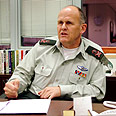
IDF: Syria, Iran behind Hizbullah flare-up
IDF Intelligence Chief Aharon Zeevi Farkash says Syria is under pressure with U.N. report on Hariri assassination due in December
Farkash noted that both Syria and Iran have an interest in heating up Israel’s northern border, with Damascus on the spot, as the final report of a United Nations probe into the assassination of former Lebanese Prime Minister Rafik Hariri is due in December and Tehran narrowly escaping referral to the Security Council over its nuclear activities.
“Hizbullah planned the latest flare-up in the north. It is a strategic plan. They hoped we would hit civilians in order to fire Katyusha rockets and they prepared themselves for the scenario along the border,” Farkash said.
He added that the IDF had intelligence tips about the Shiite group’s plans and prepared an ambush in the borderline village of Ghajar where a Hizbullah elite unit tried to kidnap soldiers last week.
“In the last confrontation, Hizbullah fired 330 shells at 25 IDF posts along the northern section. It is certainly a plan to kidnap soldiers,” Farkash said.
The group will continue to try to kidnap soldiers or Israeli citizens abroad and even display its capabilities by launching an unmanned drone over Israel, he said.
Iran has upper hand in nuclear talks with U.N.
Addressing the Iranian issue, Farkash noted that Iran is in a better position to deal with international pressure over its nuclear ambitions, with the International Atomic Energy Agency’s decision not to refer Tehran to the Security Council and to explore a Russian compromise on the issue.
If international diplomacy fails to place the Iranian nuclear file on the discussion table of the Security Council by March, the diplomatic process would have failed, he said.
Farkash said the military was concerned over an IAEA report on Iran’s nuclear activities citing connections between the Islamic theocracy and Pakistani nuclear experts.
Iran’s aspiration to become a regional superpower has alarmed the Arab world, Farkash said, adding that the Arab countries will seek to develop unconventional weapons to counterbalance Tehran’s military ascendancy.
The committee’s chairman MK Yuval Steinitz said the failure of the diplomatic path will mean a nuclear Iran. He hoped Iran would not have the upper hand in negotiations with western superpowers for long.










